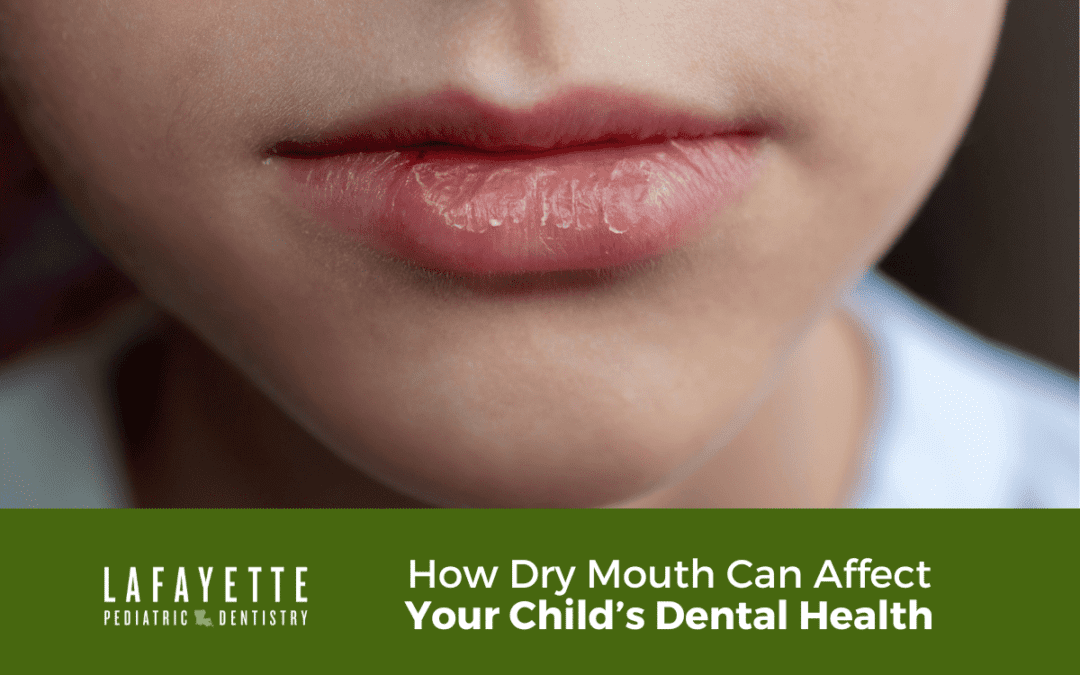Parents often find themselves vigilant about various aspects of their children’s health and well-being. Among the many things you monitor, dry mouth might not seem like a top priority.
It’s easy to dismiss it as a temporary discomfort or attribute it to not drinking enough water.
Unfortunately, many parents are unaware that chronic dry mouth can actually increase their child’s risk of developing cavities and gum disease.
Dry Mouth and Oral Health
We mentioned earlier that dry mouth can lead to cavities and gum problems, but here’s the scoop on why that happens.
Saliva does much more than just keep your child’s mouth wet; it acts like a mini cleaning crew for their teeth. When your child has a dry mouth, there’s less of this natural defense.
Saliva washes away harmful bacteria and food particles that can cause trouble, helps protect against tooth decay by providing minerals that strengthen tooth enamel, and neutralizes acids that can wear down enamel. This balance is crucial for maintaining good dental health.
But that’s not all. Saliva helps with digestion by breaking down food as soon as it enters the mouth. Plus, when your mouth is moist, drinks and foods that stain are less likely to stick to your teeth.
With a dry mouth, there’s less saliva, and your child loses these benefits. That’s why kids with dry mouth are more likely to get cavities and gum disease. Their teeth don’t have the same level of natural protection.
Read more: The 5 Most Common Causes of Cavities in Children
Signs of Dry Mouth in Children
Spotting a dry mouth in kids isn’t always easy since children might not speak up about feeling uncomfortable, so we need to keep an eye out. Here are some telltale signs that your child might be dealing with dry mouth:
Cracked Lips
Take a look at your child’s lips. Are they dry, chapped, or cracking? This could be a sign that there’s not enough moisture in their mouth. While chapped lips can happen for other reasons too, it’s worth noting if you see this along with other symptoms.
Bad Breath
If you notice your child’s breath smells off more often than usual, dry mouth could be the culprit. Without enough saliva to wash away bacteria, these tiny troublemakers can multiply and lead to an unpleasant odor.
Sore Throat
Does your child complain about a scratchy or sore throat, even when they’re not sick? A dry mouth can make the throat feel uncomfortable or irritated. If this keeps happening, they might have dry mouth.
Common Causes of Dry Mouth in Children
Here are some common reasons kids end up with a parched mouth:
Mouth Breathing
Some kids breathe through their mouths instead of their noses. This can dry out their mouths, especially at night when saliva production naturally slows down. If your child snores or sleeps with their mouth open, they might wake up with a dry mouth.
Medications
Many medicines can cause dry mouth as a side effect. This is especially true for asthma and allergy medications.
Dehydration
In Louisiana, where temperatures can soar above 90°F, it’s easy for kids to get dehydrated. Not drinking enough water throughout the day can lead to a dry mouth. Active kids who play sports or spend a lot of time outdoors are especially at risk.
Managing and Preventing Dry Mouth in Children
If you think your child has a dry mouth, the first step is to figure out the cause. Here’s what you can do based on some common causes:
For Mouth Breathers
If your child breathes through their mouth, especially at night, it’s best to have them checked by a healthcare professional. There could be underlying issues causing this, like obstructed nasal passages, a tongue tie, or small jaws, to name a few.
Ideally, we should breathe through our noses about 95% of the time. A pediatrician or pediatric dentist can help pinpoint the cause of your child’s mouth breathing and suggest the right treatment. They may recommend ways to improve nasal breathing or refer you to a specialist if needed.
For Kids on Certain Medications
Some medicines can cause dry mouth. If your child needs to take these, you can help protect their teeth by adjusting their dental care routine. This includes brushing and flossing more often and cutting back on sugary and sticky foods and drinks.
Encourage your child to rinse their mouth with water after eating or drinking anything sugary. And don’t forget to keep up with regular dental check-ups.
Read more: Tips for Keeping Your Child Cavity-Free
For Dehydration
Make sure your child drinks plenty of water throughout the day, especially when it’s hot outside or they’re being active. Keeping a water bottle handy can help remind them to sip regularly.
Read more: How Water Helps Boost Your Child’s Oral Health
A dry mouth is just one of many things that can lead to cavities in kids. To keep your child’s teeth and gums in top shape, regular dentist visits, good oral hygiene at home, and a healthy diet work together to build a strong foundation for your child’s oral health.
For families in Lafayette, Broussard, Youngsville, Breaux Bridge, and nearby areas, we’re here to help. If you have questions about dry mouth or any other dental concerns, our pediatric dental specialists at Lafayette Pediatric Dentistry are ready to assist. We’re dedicated to keeping your child’s smile bright and healthy.
